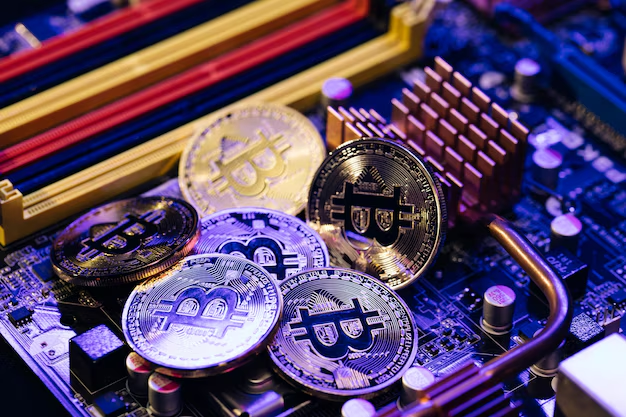Unraveling Bitcoin: What It Is and How It Works
In recent years, Bitcoin has become a buzzword synonymous with digital currency and a pioneering frontier of financial innovation. For newcomers exploring the world of cryptocurrency, understanding Bitcoin is crucial. This guide delves into Bitcoin’s basics and mechanics, initially introduced by an enigmatic individual or group under the pseudonym Satoshi Nakamoto. We will explore its core components, operational dynamics, and how it influences modern financial systems.
Bitcoin: Not Just Digital Cash
What Is Bitcoin?
Bitcoin is a type of digital or virtual currency, widely known as a cryptocurrency. Unlike traditional currencies such as dollars or euros, Bitcoin doesn't exist in physical form and is not controlled by a central banking authority. Instead, it leverages blockchain technology to operate without relying on government or financial intermediaries. This decentralization is one of Bitcoin's most appealing aspects, offering advantages in autonomy and transaction transparency.
Why Does Bitcoin Matter?
Bitcoin matters because it represents a shift towards decentralized finance—where individuals have more direct control over their financial transactions. This shift has the potential to reduce transaction fees, enhance privacy, and offer a hedge against traditional financial systems that can sometimes be restrictive or subject to inflation.
How Does Bitcoin Work?
The Blockchain Technology
At the core of Bitcoin is blockchain technology, a decentralized ledger that records all transactions across a network of computers. This technology is pivotal because it ensures the security and integrity of transaction records, reducing the chances of fraudulent activity. Each block in the blockchain is a collection of transactions that, once verified, is added to the chain, ensuring transparency and traceability.
Key Features of Blockchain:
- Decentralization: No single entity owns the network, reducing the risk of manipulation.
- Transparency: All transactions are publicly recorded, viewable by any participant, fostering trust.
- Security: Advanced cryptographic methods protect the data, making tampering nearly impossible.
Mining: Fueling the Bitcoin Network
The process known as mining plays a crucial role in Bitcoin's network. Miners validate transactions by solving complex mathematical puzzles, a mechanism termed consensus. This process secures the network while also minting new Bitcoins.
Why Is Mining Important?
- Transaction Verification: Miners confirm transactions, ensuring they are legitimate and avoiding double-spending.
- Network Security: The computational power required to solve puzzles acts as a safeguard.
- Bitcoin Creation: Mining is currently the only way new Bitcoins are introduced into circulation.
Transactions in the Bitcoin Ecosystem
Sending and receiving Bitcoin is straightforward once you grasp the basics. Transactions occur when someone with a Bitcoin wallet initiates a transfer to another wallet. Each transaction is recorded and confirmed by miners within approximately 10 minutes.
How Are Transactions Processed?
- Initiation: A Bitcoin owner uses a digital wallet to start a transaction.
- Verification: Miners validate the transaction through consensus, ensuring it's legitimate.
- Inclusion in Block: Verified transactions are added to a block.
- Completion: The block is appended to the blockchain, finalizing the transaction.
Bitcoin Wallets: Storing Your Digital Currency
Types of Bitcoin Wallets
A Bitcoin wallet is essentially a digital tool that allows you to send, receive, and store Bitcoin. Wallets integrate a pair of cryptographic keys: a public key (akin to an account number) and a private key (like a password).
Popular Wallet Variants:
- Mobile Wallets: Great for everyday transactions, easily accessed via your smartphone.
- Desktop Wallets: Offer robust security features, suitable for larger amounts.
- Web Wallets: Convenient for access from any internet-enabled device; however, security varies.
- Hardware Wallets: Physical devices offering offline storage, regarded as highly secure.
Keeping Your Bitcoin Safe
Security Tips 🛡️
- Secure Private Keys: Never share your wallet’s private keys, as they control access to your funds.
- Backup Regularly: Secure backups protect your Bitcoins from hardware failures.
- Use Two-Factor Authentication: Adds a layer of protection to your wallet access.
Exploring the Impact and Future of Bitcoin
Bitcoin's Influence on Global Finance
As Bitcoin gains mainstream traction, its impact on global finance cannot be understated. It represents a movement towards a more inclusive, global financial system devoid of the confines of national borders. Bitcoin empowers individuals in countries with unstable currencies, providing them a stable alternative for savings and transactions.
Challenges Bitcoin Faces
While Bitcoin presents numerous advantages, it faces challenges that could influence its trajectory:
- Regulatory Hurdles: Governments are still formulating regulations to address cryptocurrencies.
- Scalability Issues: As usage grows, ensuring efficient, fast transactions remains a challenge.
- Environmental Concerns: The energy-intensive process of mining has sparked debates over its ecological footprint.
The Future of Bitcoin
Predicting Bitcoin’s future is speculative, but its potential to transform the financial landscape remains an enticing prospect. As technological advancements address scalability and sustainability, its adoption could grow further, potentially solidifying its role in the global economy.
Key Takeaways and Insights 📝
- Decentralization is Key: Bitcoin’s decentralized nature offers autonomy and reduced dependency on financial institutions.
- Security and Utility: Blockchain technology ensures secure, verifiable transactions.
- Wallets Matter: Choose a secure wallet type based on your usage and security needs.
- Stay Informed: As Bitcoin and cryptocurrency regulations evolve, staying updated is crucial.
By understanding what Bitcoin is and how it functions, you can appreciate its role within the broader context of finance and technology. As the field evolves, Bitcoin's impact will likely continue to expand, ushering in new possibilities for financial inclusion and innovation.

